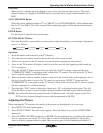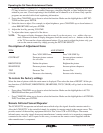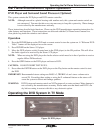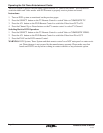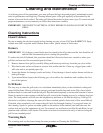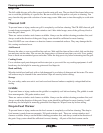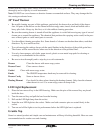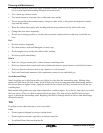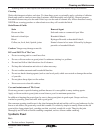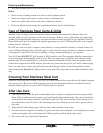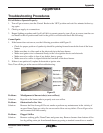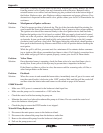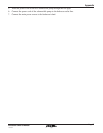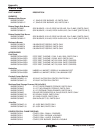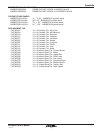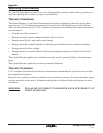Special offers from our partners!

Find Replacement BBQ Parts for 20,308 Models. Repair your BBQ today.

Barbecue Owner’s Manual
www.calspas.com
• Standing water or other liquids can deteriorate tile and grout, and should always be removed.
Cleaning
Wash with detergent solution, and rinse. To clean dingy grout, occasionally apply a solution of chlorine
bleach and water to stand not more than 5 minutes; rinse thoroughly and wipe dry. General-purpose
household cleaners may also be used if label says can be used on ceramic tile; follow directions exactly.
NEVER use scouring powders or other abrasives as they will scratch the finish.
Stain Removal Guide
Stain Removal Agent
Grease and fats Soda and water or commercial spot lifter
Inks and colored dyes Household bleach
Blood Hydrogen Peroxide or household bleach
Coffee, tea, food, fruit, lipstick, juices Neutral cleaner in hot water followed by hydrogen
peroxide or household bleach
Caution: Vinegar may damage some tile.
DO's and DON'Ts of Tile Care
• Do test scouring pads in a small area first.
• Do use a silicone sealer on grout joints if continuous staining is a problem.
• Do read and follow label directions for all cleaners.
•Do keep this information and refer to it when necessary.
• Do not combine ammonia and household bleaches.
• Do not use harsh cleaning agents (such as steel wool pads) which can scratch or damage the surface
of your tile.
• Do not place sharp object on tile surface.
• Never use wax to clean tile surface.
Care and maintenance of Tile Grout
Grout may present a special cleaning problem because it is susceptible to many staining agents.
Apply a silicone sealer to grout joints several times a year for maximum protection.
In addition to keeping the grout clean, be sure to keep grout joints in good repair. Scrape out loose,
cracked or powdery joints and refill with a good grout.
One common grouting trouble spot is the joint between the tub and and the wall in your bathroom. As the
house or tub settles, the grout may crack and crumble. It's relatively simple to remedy. Remove the old
grout with a sharp pointed tool, watching out that you don't scratch tile or tub. Then dry the joint
thoroughly and fill with a flexible caulking compound, such as silicone rubber caulking.
Synthetic Panel
Do's
• Do dust surfaces frequently.
Page 51
Cleaning and Maintenance
12/17/04



